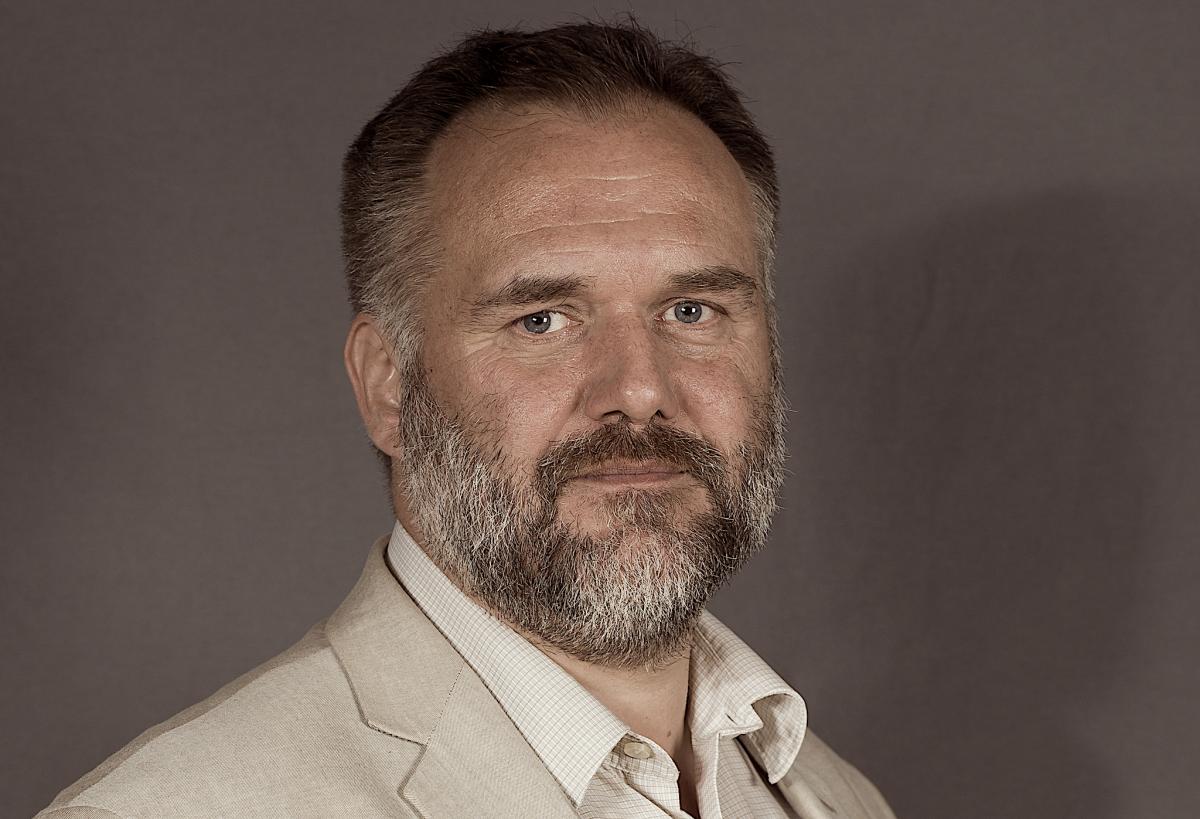Criminologist's persistence pays!
| Gorazd Meško is Professor of Criminology at the Faculty of Criminal Justice and Security at the University of Maribor in Slovenia and President of the Executive Board of the European Society of Criminology (2017-18). He teaches Criminology and Victimology (undergraduate studies), Criminology and Crime Control Policy (M.A.), Safety and Security in Local Communities (M.A.) and Comparative Criminology (Ph.D.). His research interests include crime control, crime prevention and provision of security, delinquent behaviour, and legitimacy of formal social control institutions. Gorazd Meško gave an interview to Dr Anastasia Chalkia, Criminologist and Chairperson of the Center for the Study of Crime (KEME). |
1. Professor Meško, you are systematically studying and teaching crime control and issues of security. What are the predominant trends and their most important characteristics nowadays in Europe?
I have researched a variety of criminological topics, starting with issues related to criminal careers in the 1990s, done a lot of research on policing, especially in Central and Eastern Europe, and have been a member of research teams on crime prevention, prevention of youth violence, management of urban security, legitimacy of policing, environmental crimes, etc. I am currently leading the national research on safety and security in local communities, including two international sub-projects, one with American scholars on crime, disorder, and social processes in urban environments, and another with Russian researchers on crime, disorder, and policing in tourist resorts.
I present new research findings to our students and often invite them to do research with me. I also take them to national and international conferences. We discuss relationships between criminological theory, research, and policy-making, on the one hand, and applicability of criminological analyses in the provision of safety and security in local communities, on the other.
Ideally, evidence-based policies and initiatives should be implemented, but in reality moral panics and different political interests supported by the media often influence policy-making and practice of social control. It is essential to gain international and comparative insights when studying criminological “problems”. I believe that every criminological research is of a comparative and international nature.
Establishment of a local police force (including municipality warden services) in some countries led to more repressive practices mainly concerning traffic control, while the rest of policing is a responsibility of the state police. Annually, municipalities plan to generate millions of income by collecting traffic offences fines supporting municipal budgets. So, on the one side, there are the state police forces relying on scarce financing of social control activities, while some municipalities, on the other, can focus exclusively on making “profit” based on administrative offences alone. On top of this, a public-private partnership aimed at reducing policing and imprisonment costs gives rise to new problems: the "private" police and private prisons operate according to a typical business model, following the idea of "policing for profit" and putting their employees in an unenviable position of cheap labour force.
The development of private security is flourishing these days. More and more frequently, our daily routines are monitored by private security officers,especially in shopping centres and other semi-private and private places. In addition to physical protection, the use of surveillance technology is growing rapidly.
On the one hand, the prevailing response is more control and expansion of new police techniques and methods of police operations, emphasising EU police and prosecutorial cooperation and creation of joint investigative teams to fight transnational crime, including intelligence-led policing. On the other, the emphasis on community policing is promoted to reduce radicalisation by way ofgetting to know local people and identifying potential angry, revengeful, and desperate individuals or groups of people that could develop into terrorists. Promises inherent in community policing are often questionable due to the differences between the proclaimed goals of policing and their actual implementation, reality in practice. Securitization is on the march in Europe, especially as regards terrorism. Criminal proceedings have been lowered to administrative law evidence standards in some countries.
There is a lot of manipulation in sensationalistic presentations of "crime events" in the media. Their attempts to mess with our social construction of reality result in variousimpacts spanning overreactions, anxiety, apathy, and acceptance or normalisation of deviant forms of behaviour. We can see that criminal justice systems are stable, a drop in violent crimes, especially murders,is noticeable (the civilising process), prison populations are quite stable, and an overlap between victimisation and offending (i.e., victims who become criminals) is quite frequent. There have been "tensions" between administrative and critical criminologies.
Another problem is the use of criminological research in policy-making on different levels. We are still somewhere in between common sense and evidence-based policies and practice. To learn more about that, we are organising an international conference on Criminal Justice and Security in Central and Eastern Europe – From Common Sense to Evidence-based Policy-making in Ljubljana in September 2018 (https://www.fvv.um.si/conf2018/).
Perception of safety and security differs between countries, regions, cities, towns, and rural areas. Our recent study focusing on Slovenia showed the expected differences between residents’ perception of security threats in urban and rural environments, as well as their perceptions of the police and policing. The findings concerning refugees and migrants imply that people are not afraid of them and do not perceive them as a national or a local security threat, while mainly right-wing politicians demonise and present them as a severe threat jeopardizing not only public security but also the social security of the native people. For the first time in the history of our country, military forces were called in to support the police in dealing with the refugees because of the police staff shortage.
Securitization is mainly due to terrorist attacks in the past decades while social (crime) prevention has lost its central role in social and crime control policies. These topics almost disappeared from criminologists’ agenda, except recently in a book edited by Patrick Hebberecht and Evelyne Baillergeau (2012).
2. In Slovenia, there is a long tradition concerning criminological studies, and we have been aware of it since the 9th Annual Conference of ESC which took place in Ljubljana. Could you give us a current view of criminology in Slovenia today?
Slovenia has a long tradition in teaching criminology and criminological research. It started with Aleksander Vasiljevič Maklecov, a Russian immigrant, in the 1920s. Our first institute of criminology was established in the 1950s. It is interesting that criminological research significantly influenced policy-making before 1990 but lost this role after Slovenia gained independence. In the mid-1990’s, our research started to become more international.
I believe that organisation of the ESC conference in 2009 was a great success. To host criminologists in your own country and learn about the state of the art in criminological research is a great privilege. Organising ESC conferences in different regions of Europe also diminishes stereotypes of researchers as they learn about different criminological traditions and the countries they visit during annual conferences.
In addition to the 2009 ESC conference, participation in the CRIMPREV project led by Rene Levy from GERN and his team was a massive step towards catching up with the best researchers in the field of criminology in Europe. It also influenced thinking in a broader perspective, beyond national boundaries, taking into consideration European perspectives. ESC conferences also contribute to the establishment of networks of researchers doing joint research and learning from each other. Many of them also present their national, European, and international studies.
3. You have been elected President of the ESC for the period 2017-2018. Could you tell us in a few words about the Society and its plans for the current year?
I was elected president at the 2016 ESC conference in Muenster. The three-year presidential term is meant to provide for continuity on the board and stability of the leadership of the Society.
The primary challenge is organising the next ESC conference in Sarajevo in August 2018. Organisers of the Sarajevo meeting have already set up a web page, and participants can already register for the conference. Also, it is necessary to ensure the production flow of the European journal of criminology and the ESC newsletter, and to take care of the ESC web page. We have discussed ideas for the ESC doctoral summer school, new ESC awards, and places of future conferences. It is important to mention that the ESC has many working groups which reflect the principal interests of European criminologists.
4. Taking into account the existing social and political context in Europe, what, in your opinion, should be the role of a 'European' criminology in tackling crime today?
I can agree with Michael Tonry (2014) who wrote about the development of European Criminology. European criminology depends on the development of criminology on national levels, quality of research, and criminological discourse. Criminologists must be aware of European and international dimensions of crime and social control, especially in terms of international and transnational crime, as well as of joint activities in crime prevention and law enforcement. Many researchers do not see themselves merely as “pure scientists” but as advocates of human rights and rational policies, as well as opponents of repressive and excessive laws and policies.Comparative criminological research should be facilitated and reach beyond already established studies such as the ICVS, the ISRD, Eurogang, etc. For high-quality research, more joint Ph.D. programmes and Ph.D. summer schools should be established. It is all about learning and developing researchers for the future. It is also necessary to learn policy-making skills to be able to communicate with policy-makers and other audiences.
I like the statement by Emanuel Eisner, recipient of the 2017 ESC award,that “probably the most intellectually rewarding aspect of being a criminologist for me lies in the endless opportunities to navigate between disciplines.” It emphasises the richness of multidisciplinarity of criminological research.
5. What message would you like to send to young Europeans who have just completed their studies in criminology?
I still recall the words of Dr. Loraine Gelsthorpe during my first visit to the Institute of Criminology in Cambridge, UK, in 1995. She said: “Persistence pays!” She was right. To me, being a criminologist has been a privilege. Teaching young students, conducting research, learning about new perspectives, writing in national and international publications, contributing to European, national and local policies … I like doing it, indeed. It does not mean that in the past 25 years of my teaching and research everything has run smoothly and that I haven't been frustrated from time to time. I wish the young scholars would reach for the sky and live up to their ambition to contribute to academia with good research, critical thinking, publications, and meaningful input to their communities. Obtaining a Ph.D. degree is a “ticket” which can broaden one’s opportunities to get a job at universities, research institutes, public and private law enforcement institutions, NGOs, etc. In my experience, it is after the Ph.D. that real learning begins. And lasts. It never ends...






